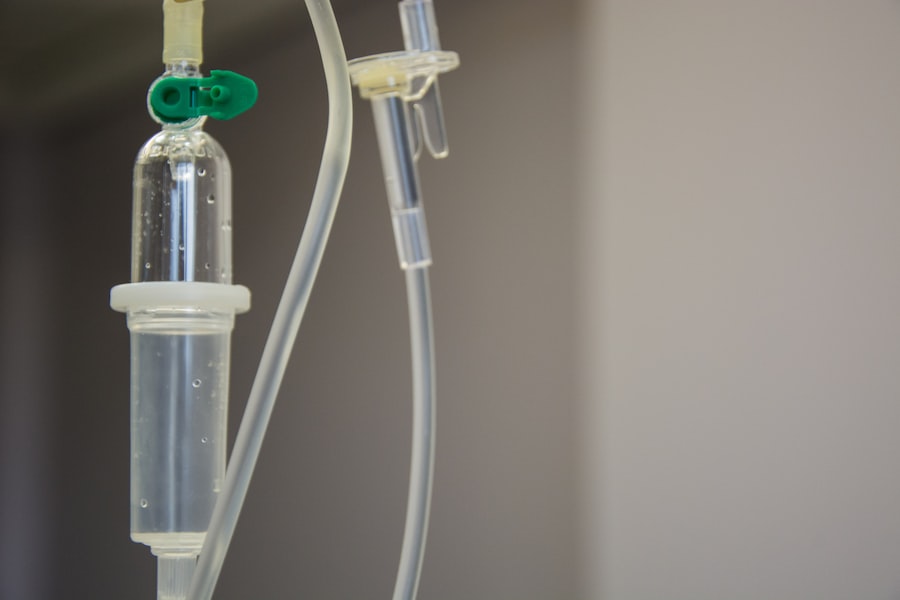Tinnitus is a condition characterized by the perception of sound in the ears or head without any external source. It is often described as a ringing, buzzing, hissing, or whistling sound. Tinnitus can be temporary or chronic and can vary in intensity. It affects millions of people worldwide and can have a significant impact on daily life.
There are several common causes of tinnitus, including exposure to loud noise, age-related hearing loss, earwax blockage, and certain medical conditions such as Meniere’s disease or temporomandibular joint (TMJ) disorders. Tinnitus can also be a side effect of certain medications.
The impact of tinnitus on daily life can be profound. It can interfere with concentration, sleep, and overall quality of life. Many people with tinnitus experience anxiety, depression, and irritability as a result of the constant noise in their ears. It can also affect relationships and social interactions.
The Importance of Seeking Professional Help: Finding an Audiologist Near Me
It is important to seek professional help for tinnitus because it is often a symptom of an underlying condition that needs to be addressed. A qualified audiologist can help determine the cause of your tinnitus and develop a personalized treatment plan.
To find an audiologist near you, you can start by asking your primary care physician for a referral. You can also search online directories or contact your local hearing healthcare center for recommendations. It is important to choose an audiologist who specializes in tinnitus management and has experience working with patients with similar symptoms.
During your first appointment with an audiologist, they will conduct a thorough evaluation to assess the severity and impact of your tinnitus. They may perform a hearing test to determine if there is any hearing loss associated with your tinnitus. They will also ask about your medical history and any medications you are taking. Based on this information, they will develop a treatment plan tailored to your specific needs.
Tinnitus Treatment Options: Exploring Hearing Solutions Near Me
There are several treatment options available for tinnitus, and the best approach will depend on the underlying cause and individual needs. Hearing solutions, such as hearing aids, are often recommended for tinnitus management.
Hearing aids can help with tinnitus by amplifying external sounds and reducing the perception of tinnitus. They can also provide relief by masking the sound of tinnitus with more pleasant sounds. Many modern hearing aids come with built-in tinnitus masking features, allowing users to customize their sound therapy.
In addition to hearing aids, other hearing solutions for tinnitus include sound generators and combination devices that combine the benefits of both hearing aids and sound generators. Sound generators produce a variety of sounds, such as white noise or nature sounds, to help mask the sound of tinnitus and promote relaxation.
Hearing Aids for Tinnitus: How They Work and Their Effectiveness
Hearing aids can be an effective treatment option for tinnitus. They work by amplifying external sounds, which can help distract from the perception of tinnitus. By increasing the overall level of sound in the environment, hearing aids can make tinnitus less noticeable.
There are different types of hearing aids available for tinnitus management, including behind-the-ear (BTE), in-the-ear (ITE), and completely-in-the-canal (CIC) styles. BTE hearing aids are the most common and are suitable for a wide range of hearing loss and tinnitus severity. ITE and CIC hearing aids are smaller and more discreet but may not be suitable for severe hearing loss or certain types of tinnitus.
The effectiveness of hearing aids for tinnitus varies from person to person. Some individuals experience significant relief from their tinnitus symptoms with the use of hearing aids, while others may only experience partial relief. It is important to work closely with your audiologist to find the right hearing aid settings and sound therapy options that work best for you.
Sound Therapy for Tinnitus: Masking and Habituation Techniques
Sound therapy is a common approach used in the management of tinnitus. It involves the use of external sounds to mask or distract from the perception of tinnitus. There are two main types of sound therapy for tinnitus: masking and habituation techniques.
Masking techniques involve using external sounds to cover up or mask the sound of tinnitus. This can be done through the use of white noise machines, sound generators, or even everyday sounds such as a fan or soft music. The goal is to provide relief by reducing the contrast between the sound of tinnitus and the surrounding environment.
Habituation techniques aim to help individuals habituate or become accustomed to the sound of tinnitus. This can be achieved through the use of low-level background sounds that are similar in frequency and pitch to the individual’s tinnitus. Over time, the brain learns to filter out the sound of tinnitus, making it less noticeable and bothersome.
Cognitive Behavioral Therapy for Tinnitus: Addressing Emotional Distress

Cognitive behavioral therapy (CBT) is a form of therapy that focuses on changing negative thought patterns and behaviors. It has been found to be effective in helping individuals cope with tinnitus-related emotional distress.
CBT for tinnitus typically involves identifying and challenging negative thoughts and beliefs about tinnitus, developing coping strategies, and implementing relaxation techniques. It can also help individuals develop a more positive mindset and improve their overall quality of life.
Techniques used in CBT for tinnitus may include cognitive restructuring, relaxation training, stress management, and mindfulness meditation. These techniques can help individuals gain control over their emotional response to tinnitus and reduce anxiety and depression associated with the condition.
Medications for Tinnitus: When They Are Appropriate and How They Work
Medications are not typically the first line of treatment for tinnitus, but they may be considered in certain cases. Medications for tinnitus are usually prescribed to address an underlying condition that may be contributing to the symptoms.
For example, if tinnitus is caused by a blood vessel disorder, medications that improve blood flow or reduce inflammation may be prescribed. If tinnitus is associated with anxiety or depression, medications that target these conditions may be recommended.
It is important to note that medications for tinnitus are not a cure and may only provide temporary relief. They should always be used under the guidance of a healthcare professional and in conjunction with other treatment options.
Alternative Treatments for Tinnitus: Acupuncture, Hypnosis, and More
In addition to traditional treatment options, there are also alternative treatments that some individuals find helpful in managing their tinnitus. These treatments include acupuncture, hypnosis, herbal supplements, and relaxation techniques.
Acupuncture involves the insertion of thin needles into specific points on the body to promote balance and healing. Some individuals report relief from tinnitus symptoms after acupuncture sessions, although more research is needed to determine its effectiveness.
Hypnosis is a technique that uses guided relaxation and focused attention to help individuals achieve a heightened state of awareness. It can be used to help individuals relax and reduce stress, which may in turn alleviate tinnitus symptoms.
Herbal supplements such as ginkgo biloba and zinc have been studied for their potential benefits in managing tinnitus. While some individuals report improvement with these supplements, more research is needed to determine their effectiveness.
Relaxation techniques such as deep breathing exercises, yoga, and meditation can also help individuals manage stress and reduce the impact of tinnitus on daily life.
The Benefits of Tinnitus Treatment: Improved Quality of Life and Mental Health
Seeking treatment for tinnitus can have a significant impact on quality of life and mental health. By addressing the underlying causes of tinnitus and implementing appropriate treatment options, individuals can experience relief from their symptoms and improve their overall well-being.
Tinnitus treatment can help individuals sleep better, concentrate more effectively, and engage in social activities without the constant distraction of tinnitus. It can also reduce anxiety, depression, and irritability associated with the condition.
In addition to these immediate benefits, seeking treatment for tinnitus can also prevent further damage to the auditory system and reduce the risk of developing additional hearing problems in the future.
Taking the First Step Towards Tinnitus Relief with an Audiologist Near Me
In conclusion, tinnitus is a common condition that can have a significant impact on daily life. It is important to seek professional help for tinnitus to determine the underlying cause and develop a personalized treatment plan.
There are several treatment options available for tinnitus, including hearing solutions, sound therapy, cognitive behavioral therapy, medications, and alternative treatments. The best approach will depend on the individual’s specific needs and preferences.
By seeking treatment for tinnitus, individuals can experience improved quality of life, better mental health, and relief from their symptoms. Taking the first step towards tinnitus relief with an audiologist near you is an important step towards regaining control over your life and finding relief from the constant noise in your ears.
If you’re looking for the top audiologist in Malaysia to help with your tinnitus treatment, look no further than HearCare Malaysia. In their article “The Sound Solution: Unveiling the Top Audiologist in Malaysia,” they provide valuable insights into the best professionals in the field. With their expertise and experience, they can guide you towards effective solutions for managing and treating tinnitus. Check out the article here to learn more about how HearCare Malaysia can help you find relief from tinnitus.
FAQs
What is tinnitus?
Tinnitus is a condition characterized by the perception of sound in the absence of an external source. It can manifest as ringing, buzzing, hissing, or other sounds.
What causes tinnitus?
Tinnitus can be caused by a variety of factors, including exposure to loud noise, ear infections, certain medications, and underlying health conditions such as high blood pressure or hearing loss.
What is Kangar?
Kangar is a tinnitus treatment device that uses sound therapy to help manage the symptoms of tinnitus.
How does Kangar work?
Kangar works by playing a variety of sounds that are designed to mask the sounds of tinnitus. The device can be customized to the individual’s specific needs and preferences.
Is Kangar effective?
Studies have shown that sound therapy can be an effective treatment for tinnitus. However, the effectiveness of Kangar specifically may vary depending on the individual and the severity of their tinnitus.
Is Kangar safe?
Kangar is generally considered safe for most individuals. However, it is important to consult with a healthcare professional before using any new treatment for tinnitus.
Where can I get Kangar?
Kangar is available for purchase online and through select healthcare providers. It is important to ensure that you are purchasing Kangar from a reputable source.

